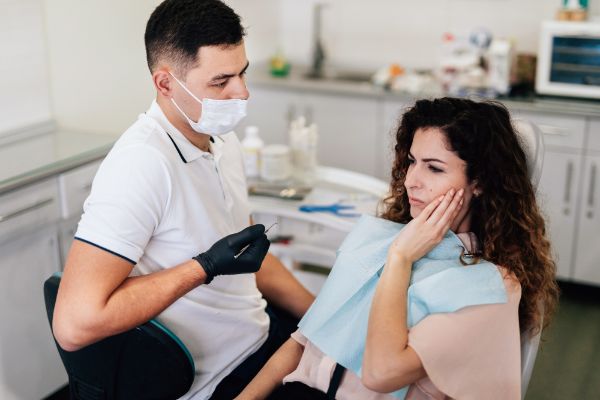Understanding the Link Between Stress and Teeth Grinding
Stress, in simple terms, is a response to any stimuli that requires us to adjust or adapt. This can be anything from a demanding job to a difficult relationship.
The body’s response to stress involves the release of hormones like adrenaline and cortisol, which helps us stay alert and focused in challenging situations. However, chronic stress can have a negative impact on our physical and mental health.
One of the common physical manifestations of stress is teeth grinding or bruxism. The involuntary clenching or grinding of teeth can occur during sleep or while awake.
While occasional teeth grinding is not harmful, persistent bruxism can cause dental problems like worn-down teeth and jaw pain. In this article, we will explore the link between stress and teeth grinding in detail.
We will examine the causes, symptoms, treatment options for bruxism as well as practical tips for reducing daily stress levels. By understanding how stress affects our oral health, we can take steps to protect our smiles and overall well-being.
What is teeth grinding(also known as bruxism)?
Have you ever experienced clenching or grinding your teeth? This habit is called bruxism, and it is one of the most common dental problems that people encounter. Teeth grinding can occur during sleep or while awake, and it affects both adults and children.
Bruxism is a condition where a person unconsciously grinds their teeth or clenches their jaw. It can happen at any time of the day, but it’s most common during sleep. It can be mild or severe, and some people don’t even know they’re doing it until they experience symptoms such as headache, jaw pain, and tooth sensitivity.
Teeth grinding during sleep or while awake
Teeth grinding when you’re asleep is known as sleep bruxism. The exact cause of this type of bruxism is unclear, but medical experts suggest that stress and anxiety are some of its contributing factors. On the other hand, awake bruxism occurs when you clench your jaw or grind your teeth while being conscious.
Unlike sleep bruxism which may be caused by unconscious habits related to stress, awake bruxism may be caused by an aligned bite-occlusion issue wherein the upper and lower jaws do not meet correctly with each other. Both types may result in similar symptoms such as headaches in the morning, soreness in the jaw muscles upon waking up or throughout the day & worn down teeth over time due to wear-and-tear on the enamel from constant rubbing between opposing rows of teeth for extended periods – although these symptoms tend to be more pronounced in night-time grinders since they are unaware they are doing so at all!
Causes of teeth grinding
Teeth grinding, also known as bruxism, can occur for various reasons. However, stress is considered the primary cause of this condition.
When people experience high levels of stress or anxiety, it can manifest itself in different ways throughout the body. Teeth grinding is one of the ways our bodies cope with stress.
In addition to stress, other factors may contribute to bruxism. People with anxiety disorders are more likely to grind their teeth than those without them.
Sleep disorders such as sleep apnea and obstructive sleep apnea have also been linked to bruxism. Certain medications like antidepressants and antipsychotics that affect serotonin levels in the brain can increase the risk of teeth grinding.
It’s important to understand that these factors do not necessarily cause bruxism on their own but rather increase its likelihood when someone experiences high levels of stress or anxiety. Understanding the causes of your teeth grinding can help you identify triggers and take steps to manage it before it becomes a chronic problem that affects your overall health and well-being.
Stress as a primary cause of teeth grinding
Stress is by far the most common trigger for teeth grinding. The human body has evolved over millions of years to respond quickly and efficiently to perceived threats such as predators or natural disasters by preparing us for fight-or-flight response through an increase in adrenaline and cortisol hormone levels.
Even if we don’t have immediate physical danger present around us, our bodies often interpret everyday events like job pressure or relationship problems as threats resulting in chronically elevated cortisol levels which eventually take a toll on our general health. One way our bodies release this excess energy is through clenching and then subsequently grinding our teeth together while we sleep or during times when we’re feeling especially tense.
Other factors
While stress is considered the primary cause of teeth grinding, several other factors can contribute to this condition. People with anxiety disorders may grind their teeth more frequently than those without these conditions.
Sleep disorders such as sleep apnea and obstructive sleep apnea have also been linked to bruxism. Additionally, certain medications like antidepressants and antipsychotics can increase the risk of teeth grinding by altering serotonin levels in the brain.
It’s worth noting that not everyone who experiences these factors will develop bruxism, but they may increase the likelihood of it occurring in people who are already susceptible. By understanding these additional contributing factors, individuals can better understand their own risk for developing bruxism and seek help early if necessary.
Symptoms of teeth grinding
Some common signs that you may be grinding your teeth, including jaw pain, headaches, and worn-down teeth. Jaw pain is one of the most common symptoms of bruxism.
You may experience a dull ache or sharp pain in your jaw muscles when you wake up in the morning or throughout the day. This pain can also radiate to other areas such as your ears and temples.
Headaches are also a frequent symptom of teeth grinding. The pressure and tension caused by clenching your jaw muscles during sleep can lead to headaches that range from mild to severe.
If you notice that you wake up with a headache or experience them more frequently than usual, it might be time to investigate whether bruxism is the culprit. Worn-down teeth are another sign of bruxism.
Over time, constant clenching and grinding can cause damage to your enamel and lead to chipped or broken teeth. This type of damage can not only be unsightly but also negatively impact overall health by making it difficult for you to chew food properly.
It’s important to recognize these symptoms early on in order to prevent further damage and seek professional help if necessary. Don’t let stress take control over your oral health- take action today!
Treatment options for teeth grinding
Mouth guards
One of the most common treatment options for teeth grinding is a mouth guard, which can be worn while sleeping to protect the teeth from further damage. There are different types of mouth guards available, including custom-made ones that are specifically designed to fit your mouth and over-the-counter options that can be purchased at a pharmacy. While mouth guards may not necessarily stop the teeth grinding altogether, they can alleviate some of the symptoms associated with bruxism.
Stress management techniques
Since stress is often a key contributor to teeth grinding, stress management techniques can also be beneficial in treating bruxism. This includes regular exercise, learning relaxation techniques like yoga or meditation, and seeking counseling or therapy to address underlying emotional issues that may be causing stress.
Medication in severe cases
In severe cases of bruxism where neither a mouth guard nor stress management techniques provide relief, medication may be prescribed. Muscle relaxants and anti-anxiety medication are commonly used to decrease muscle activity and relieve tension in the jaw muscles. However, it’s important to note that medication should only be used under the guidance of a healthcare professional.
Seeking professional help for persistent bruxism
It’s important to seek professional help if you have persistent bruxism as it can lead to long-term damage if left untreated. A dentist or doctor can evaluate your symptoms and recommend an appropriate course of treatment based on the severity of your condition.
Ignoring symptoms such as constant headaches or jaw pain could lead to serious health problems such as temporomandibular joint (TMJ) disorder or even tooth loss in severe cases. In addition, seeking professional help will ensure that you receive proper guidance on managing stress levels which will also greatly benefit overall health and wellbeing.
Remember that the longer you wait to address bruxism, the more difficult it may be to treat. So, if you suspect that you are grinding your teeth, don’t hesitate to seek help from a professional.
Prevention tips for reducing stress-related teeth grinding
Offer practical tips for reducing daily stress levels such as exercise or meditation
One of the most effective ways to prevent teeth grinding is by reducing daily stress levels. Stress can come from a variety of sources, including work, relationships, and finances.
By implementing regular activities that promote relaxation and calmness, you can reduce your overall stress level. One great way to do this is through exercise.
Exercise releases endorphins in the brain which improve your mood and reduce feelings of anxiety. Even a short walk around the block during your lunch break can make a big difference in how you feel throughout the day.
Another great way to reduce stress levels is through meditation. Meditation has been shown to have numerous benefits for both mental and physical health, including reduced anxiety and lower blood pressure.
If you’re new to meditation, there are many resources available online that can help you get started. Try setting aside 10-15 minutes each day for a guided meditation or simply sit quietly and focus on your breath.
The Link Between Stress and Teeth-Grinding
Recognizing the link between stress and teeth-grinding is crucial for both dental health and overall wellbeing. Stress can cause a host of physical and emotional symptoms, including bruxism.
If left untreated, teeth-grinding can lead to tooth damage, jaw pain, headaches, and other issues that can negatively impact daily life. It’s important to seek professional help if you suspect that you are grinding your teeth due to stress or any other factors.
A dentist can help identify the underlying causes of bruxism and recommend appropriate treatment options such as a mouthguard or relaxation techniques. Reducing daily stress levels through exercise, meditation, or other relaxation techniques before bed may also be helpful in preventing teeth-grinding related to stress.
Remember that with proper care and attention, teeth-grinding related to stress is treatable. By recognizing the link between stress and bruxism early on, taking steps to manage stress levels, seeking professional help when necessary – we can improve our dental health as well as our overall wellbeing.
Take the first step towards optimal oral hygiene. Reserve your dental appointment at our Huntington Beach dental office now and experience personalized care.




